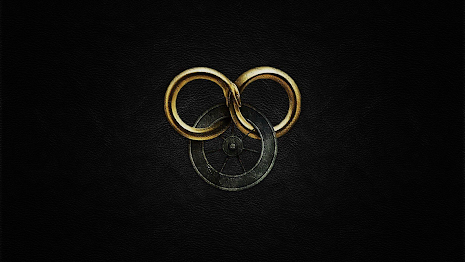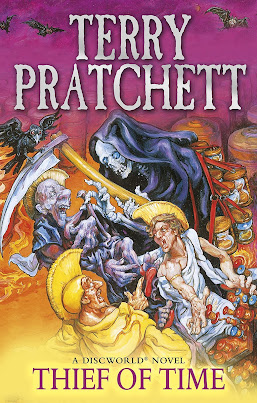Conman Moist von Lipwig is sentenced to death-by-hanging, but is saved at the last second by Ankh-Morpork's Patrician, who then tasks him with resurrecting the Post Office (this passes for a career path on Discworld). Moist finds his task complicated by a tiny staff, a headquarters overrun by decades' worth of undelivered mail, and competition from the Grand Trunk Semaphore Company, who can send a message across the entire continent in the time it takes a mailman to have his first cuppa of the day. It falls to Moist, several golems and a very punctual cat to save the Post Office and restore a decrepit Ankh-Morpork institution to greatness. Or something adjacent to it, anyway.
Going Postal, the thirty-third Discworld novel, is a super red-hot, contemporary piece of timely fiction. It's Sir Terry Pratchett's exploration of zeitgeisty ideas like late-stage capitalism and ensh!tt!f!cat!on, the way a beautiful and amazingly convenient idea/business is taken over the money people and the product is made ten times worse in the relentless pursuit of extra profit, and any attempt to compete with it is ruthlessly crushed by lawyers or the competition just being bought out.
Of course, Pratchett had no truck with the linear progression of time, hence this hugely topical piece of modern metafiction actually came out in 2004, which may indicate that Pratchett was a peerless seer of the future or he was just engaging with constant truths of human nature.
Most book series, let alone fantasy book series, struggle when they're thirty-three volumes deep. The author can be forgiven for phoning things in, settling back on their laurels or employing thinly-veiled cover versions of their earlier character and storylines and collecting the cheque. After teetering a little on the precipice of that in the mid-twenties of the novels, Pratchett decided to go the more difficult route of challenging himself with new characters and new audiences, such as the YA focus of the Tiffany Aching sub-series. Going Postal appears to be familiar, with the story once again exploring the introduction of a real life concept to the fantasy metropolis of Ankh-Morpork and the resulting mayhem (one of the oldest standby plots in the series), but it's got a much sharper bite than some of the earlier novels in the same vein, and the protagonist - an unrepentant conman and charlatan - is a bit darker than Pratchett's norm. Pratchett's protagonists are sometimes well-meaning bumblers who end up becoming heroes reluctantly, or older, more established, overly-cynical veterans who are dragged back into being in the thick of events, or hyper-competent people constantly bewildered by the incompetence of everyone else in the world. Moist von Lipwig is different, and maybe a bit more challenging than most of Pratchett's characters, being a lot more selfish and less sympathetic.
This all combines to make Going Postal feel incredibly familiar and quite new and fresh, which is an impressive achievement. The book also makes a statement by starting with a bang and just keeps going, with Moist plucked from certain death into uncertain-death-by-tedious-bureaucracy and the story moving like a freight train, despite its (by Pratchettian standards) generous 470+ page count. We get cameos by the City Watch and Unseen University wizards, but for once they don't take over the book. We also get a bit more of Patrician Vetinari than normal, and more insights into how Vetinari keeps the messy engine of the city running without going stark raving mad. The semaphore towers - the "clacks" - have been a key part of the background worldbuilding for quite a few novels now but here take front and centre, with plenty of exploration of how the service works and its own arcane customs (like the memories of deceased tower operators kept alive in the network, zooming back and forth along the network).
Pratchett packs a lot in, including further exploration of the golems and a potential romance between Moist and the chain-smoking Adora Bell Dearheart. Maybe even too much: the romance doesn't get a huge amount of development and he seems to lose a little bit of the thread with what to do with the villain at the end, who first appears to being set up as an ongoing antagonist to Moist but Pratchett seems to change his mind at the last minute.
But it's hard to argue with the results. Going Postal (****½) manages to feel safe and edgy at the same time, bringing in ideas both new and old and unfolding with some vigour. Pratchett is on fine form here, and with Moist von Lipwig he has created a compelling new protagonist whom you'll look forwards to seeing again.













